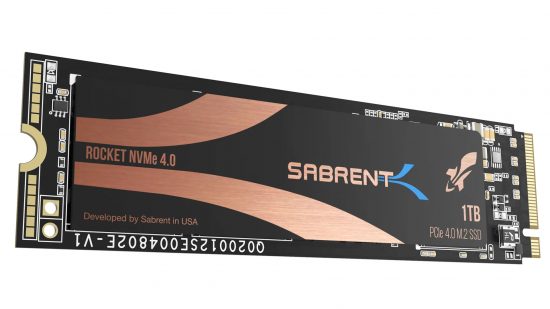Our Verdict
92%A great software bundle just about pips the competition to the post, but the Sabrent performs similarly to the competition.
With so few PCI-E 4 SSDs on the market at the moment, and even fewer controllers to differentiate them, the Sabrent Rocket NVMe 4.0 has its work cut out if it wants to differentiate itself from the Corsair Force MP600 and Gigabyte Aorus NVMe Gen4 SSD.
All three of these drives are based on the same Phison PS5016-E16 controller, as well as Kioxia TLC NAND memory. What’s more, all three of these competing drives sport the same capacity options, with our sample offering 1TB of total storage space, with a formatted capacity of 931GB – the rest of the storage space is used for overprovisioning. The Sabrent also offers the same 1,800TBW endurance rating and five-year warranty as the Corsair and Gigabyte drives.
At first glance, the Sabrent Rocket NVMe 4.0 might appear to lose ground to the other two SSDs with its lack of a sporty heatsink. As a result, during our thermal stress test, the Sabrent’s peak temperature hit 82°C, while the Corsair MP600, for example, reached just 66°C in the same test. However, there’s also a sliver of copper on top of the SSD beneath the label to spread the heat, allowing you to easily use your motherboard’s heatsink instead.
As a result, we can’t be too harsh here, as most PCI-E 4 motherboards offer at least one M.2 port with a heatsink. For an extra $50 you can obtain the same SSD with a large heatpipe-equipped heatsink, but we’d sooner spend less money and find another means of cooling it.
Meanwhile, Sabrent’s software is very similar to that of Corsair, with basic controls over firmware updates and overprovisioning, as well as temperature monitoring. It also looks less dated than Corsair’s supplied software. What’s more, while Corsair’s software can clone SSDs, as a bonus you get a full copy of Acronis True Image with the Sabrent Rocket NVMe 4.0. This is a more powerful and flexible tool when it comes to drive imaging, so given that the two SSDs cost about the same amount of money, if you’re not fussed by the Corsair’s heatsink, the Sabrent Rocket NVMe 4.0 just edges ahead in terms of value.
In terms of performance, the Sabrent’s test results were unsurprisingly almost identical to those of the other three SSDs based on Phison controllers on test this month. That said, the Corsair lost a little ground in a couple of tests to the Sabrent, which resulted in the latter gaining a small advantage, with peak sequential read and write speeds of 5,002MB/sec and 4,258MB/sec.
Interestingly, there were very few areas where the more expensive Samsung 980 Pro was ahead. The only significant area was raw sequential read speed, which was close to 1,802MB/sec faster, while its sequential write speed was 676MB/sec faster. These tests don’t represent most people’s real world, though – you’ll be hard pushed to tell the difference for the most part.
Sabrent Rocket NVMe 4.0 pros and cons
Pros
- Reasonable price
- Fast sequential transfers
- Good software
Cons
- No heatsink
- Can get toasty without extra cooling
- Competition looks better
Sabrent Rocket NVMe 4.0 specs
The Sabrent Rocket NVMe 4.0 specs list is:
| Interface | PCI-E 4 |
| Max capacity | 1TB |
| Formatted capacity | 931GB |
| Controller | Phison E16 |
| Endurance rating | 1,800TBW (2TB) |
| Warranty | Five years |
| NAND | TLC |
Sabrent Rocket NVMe 4.0 price
Price: Expect to pay $190 for 2TB, $90 for 1TB
Sabrent Rocket NVMe 4.0 review conclusion
While the performance of the Sabrent Rocket might be similar to that of the other Phison controller-based drives, and you don’t get a fancy heatsink with it either, the Sabrent offers superb value. Not only is it keenly priced, but you also get a copy of Acronis True Image, and most PCI-E 4 motherboards come with M.2 heatsinks anyway.
However, such Phison-based SSDs are identical under the hood, so it’s really down to how much you want to spend and whether you need a heatsink. In other areas, such as performance and warranty, there’s nothing between these drives, but the Sabrent Rocket NVMe 4.0 just about offers the best value.
Looking for more storage upgrade options? Check out our guide to the best gaming SSD where we recommend options for every budget, with 1TB drives starting from just $55.
